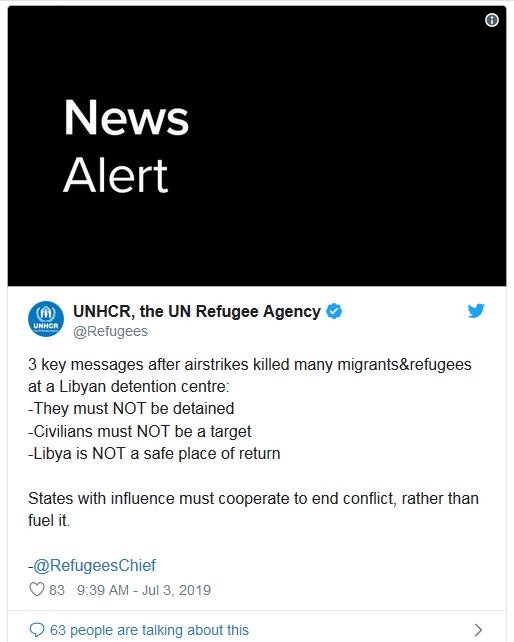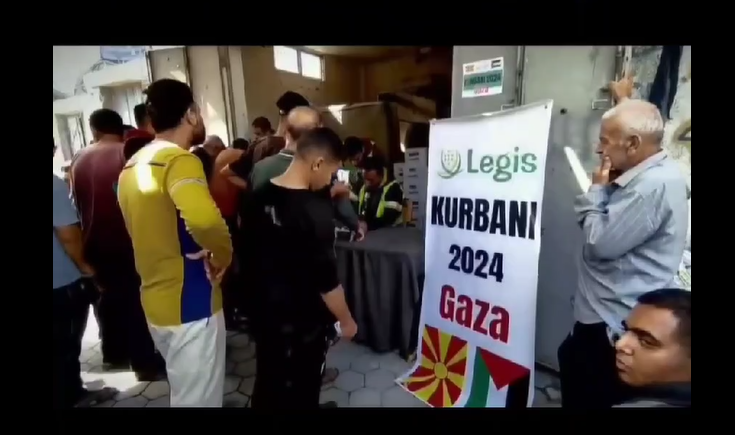Warlord Khalifa Haftar blamed for airstrikes in which at least 44 people are killed
At least 44 people, and possibly many more, have been killed in the bombing of a detention centre south of Tripoli condemned by the UN Libya envoy as a possible war crime.
Ghassan Salamé said the attack, apparently carried out by forces loyal to the warlord Khalifa Haftar, “clearly could constitute a war crime, as it killed by surprise innocent people whose dire conditions forced them to be in that shelter”.
At least 130 people were injured in the attack on the Tajoura detention centre, which the UN-backed Government of National Accord (GNA) said had been hit by two airstrikes.
Most of the dead will be people held in detention after attempting to reach Europe on clandestine sea crossings from Libya.
Salamé added: “The absurdity of this ongoing war today has led this odious bloody carnage to its most hideous and most tragic consequences.”
The African Union also issued a statement calling for an inquiry into responsibility for the attack.
It is the highest publicly reported death toll from an airstrike or shelling since eastern forces loyal to Haftar launched an offensive with ground troops and aircraft three months ago to take the capital held by the internationally recognised government.
NGOs receiving voice messages from the detention centre said the death toll was higher, and accused Europe of ignoring warnings about the threat posed to the detention centres by Haftar’s repeated air raids on the city over the past two months.
About 120 people are reported to have been held in the hangar, which took a direct hit,, while more than 600 people, including children, were inside detention centre complex.
The UN refugee agency, UNHCR, said it was “extremely concerned” at news of the attack, but there will be questions about why detainees had not been moved by the agency given previous raids close to the centre.

Prince Alfani, a medical coordinator in Libya for Médecins Sans Frontières, said the attack was not the first time migrants and refugees had been caught in the crossfire of the conflict in Tripoli. “Just eight weeks ago in Tajoura detention centre shrapnel from the blast tore through the roof of the women’s hanger and nearly hit an infant.”
An official in the Libyan health ministry, Dr Khalid bin Attia, attended the scene of the strike and described the carnage to the BBC World Service: “We couldn’t see the area very clear but just when the ambulance came, it was horrible. Blood is everywhere, somebody’s guts in pieces.”
Haftar’s Libyan National Army (LNA) denied responsibility, but only on Monday Haftar’s air force commander Mohammed al-Manfour had warned that his forces would intensify air raids on Tripoli.
Manfour called on residents to stay away from what he called the “militia camps”, in reference to the Libyan army forces. The detention centre was close to a military headquarters.
His threats come days after GNA forces regained control of the strategic town of Gharyan, north-west Libya, a breakthrough in the military deadlock. The LNA has failed to capture the capital, Tripoli, since a surprise attack on 4 April.
In a statement the GNA denounced the attack as a “heinous crime” and blamed it on the “war criminal Khalifa Haftar”.It accused pro-Haftar forces of having carried out a “premeditated” and “precise” attack on the detention centre.
More than 800 people have been killed in the fighting, which started when Haftar mounted a surprise assault on Tripoli, upending a painstakingly prepared peace plan drawn up by Salamé.
The NGO Exodus claimed that Haftar’s forces were responsible for the raid but said: “The bombardment, however criminal, is due to the equally criminal practice implemented by GNA forces of President Fayez al-Sarraj to use migrants as human shields, hiding militias and armaments inside detention centres crowded with migrants.”
The group said it had been warning European leaders for two months that people in the detention centres were in danger due to the air raids, but its pleas had been met only with “grim political calculation”.
Despite a UN arms embargo, the fighting has been supported by regional players, with Turkey militarily backing the UN-recognised government of national accord. The LNA has been supported by the United Arab Emirates and Egypt.
Thousands of people are held in government-run detention centres in western Libya in what human rights groups and the UN say are often inhuman conditions.
Advertisement
In a tweet the UNHCR said:
UAE weaponry, some apparently sourced from the US, was discovered last week when LNA forces fled the Gharyan attack. The Democratic senator Bob Menendez warned this week that the US could halt arms sales to the UAE.
In a letter to the US secretary of state, Mike Pompeo, Menendez called for clarifications regarding the arms deals with the UAE by mid-July.
“You know that if these allegations were true, you would have to cancel all arms sales to the UAE. Such a behaviour and misuse of our arms constitutes a violation of the US laws and the UN ban of arms on Libya.” the senator said.
The UAE on Tuesday denied supplying arms to Haftar. The president of Libya’s House of Representatives, Aguila Saleh, a supporter of Haftar called for the formation of an international commission on what he considered the “unacceptable interference by Turkey in Libyan affairs”.
In a letter addressed to UN secretary general, António Guterres, and the Egyptian president, Abdel Fatah el-Sisi, who is heading the current session of the African Union, Saleh accused Turkey of “supporting armed militias against the army forces of the general command”, referring to the three-month-old war in the capital.
The conflict threatens to allow Islamist militants to fill a security void, disrupt oil supplies, boost migration across the Mediterranean to Europe, and scupper UN plans for an election to end rivalries between parallel administrations in east and west.
Reuters and Agence France-Presse contributed to this report
Source: theguardian





